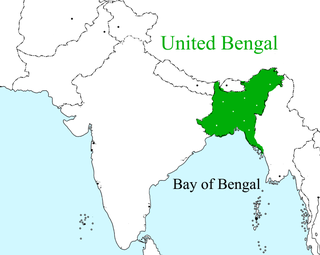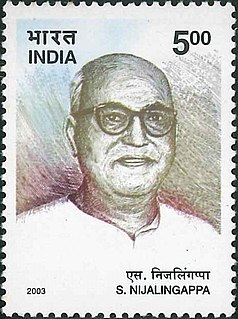Related Research Articles
Sikkim Scheduled Caste League (SSCL), a political party in Sikkim, was formed on the model of the Scheduled Caste League of Dr. B.R. Ambedkar. SSCL demanded a democratic government, as opposed to the then monarchic regime of Sikkim.

United Bengal was a proposal to transform Bengal Province into an undivided, sovereign state at the time of Partition of India in 1947. It sought to prevent the division of Bengal on religious grounds. The proposed state was to be called the Free State of Bengal. A confessionalist political system was mooted. The proposal was not put up for a vote. The British government proceeded to partition Bengal in accordance with the Mountbatten Plan and Radcliffe Line.

General elections were held in India between 25 October 1951 and 21 February 1952. They were the first elections to the Lok Sabha after independence in August 1947. It was conducted under the provisions of the Indian Constitution, which was adopted on 26 November 1949. Elections to most of the state legislatures took place simultaneously.
In India, a number of political positions and university posts are held for specific groups of the population, including Scheduled Castes and Scheduled Tribes, and women in some cases.

Bidar Lok Sabha constituency is one of the 28 Lok Sabha (parliamentary) constituencies in Karnataka state in India. This constituency came into existence in 1962. It was reserved for the candidates belonging to the Scheduled castes till 2008. It comprises the entire Bidar district and part of Gulbarga district.

Nagapattinam is a Lok Sabha constituency in Tamil Nadu. The seat is reserved for scheduled castes. Dalit agricultural workers form a large part of the electorate in the constituency. The constituency is noted for being an historically communist stronghold, having elected Communist Party of India parliamentary representative seven times.
Kaushik or Kaushike or Koushik/Kousik is the highest caste of patri-clan (gotra) of Brahmins and Kshatriya named after Brahmarishi Vishvamitra. Kaushik is used as surname by Brahmins and Kshatriya of Vishwamitra or Kaushika gotra. Kaushik/Koushik is ancient Indian'Gotra' applied to an Indian clan. Origin of Kaushik can be referenced to an ancient Hindu text. There was a Rishi (saint) by the name of "Vishvamitra" literally meaning 'friend of the universe','Vishwa' as in universe and 'Mitra' as in friend, he was also called as Rishi "Kaushik".Vishvamitra is famous in many legendary stories and in different works of Hindu history. Kaushika is pravara of Vishwamitra gotra.

The first legislative assembly Election to the Madras state based on universal adult suffrage was held in March 1952. This was the first election held in Madras state after the Indian Independence. This election was officially known as the 1951 Madras State Election, even though through delays, actual voting didn't take place until early 1952.

The second legislative assembly election to the Madras state was held on 31 March 1957. This was the first election held after the linguistic reorganization of Madras state in 1954. Indian National Congress and its leader K. Kamaraj won the election, and defeated its rival Dravida Munnetra Kazhagam. In 1954, due to the resignation of C. Rajagopalachari, for his controversial Kula Kalvi Thittam, the leadership of Congress was contested, between K. Kamaraj, and C. Subramaniam. Eventually, K. Kamaraj, won the support of the party, was elected leader and chief minister of Madras State in 1954. In a surprise move, he appointed both M. Bhaktavatsalam and C. Subramaniam, in his cabinet, allowing great unity amongst Congress, that ruled the state of Madras, for the next decade. This election saw future DMK leaders, M. Karunanidhi and K. Anbazhagan winning their first MLA seat in the legislative assembly.

B. Shyam Sunder was born in Aurangabad district in Maharashtra State, India. His father was B. Manicham, a railway employee, and his mother Sudha Bai and had one younger sister. He was a political thinker, jurist, prolific writer, parliamentarian and a revolutionary leader. In 1937, he founded the Dalit-Muslim unity movement at Parbhani in Aurangabad, Maharashtra and urged his people to join hands with Muslims. He was a legislator representing Andhra Pradesh and Mysore State.
U. C. Raman is an Indian politician from Kerala. As of 2011 he was the state president of the Indian Union Dalit League, the Scheduled Caste wing of the Indian Union Muslim League.

The 1952 Coorg Legislative Assembly election was held to constitute the Coorg Legislative Assembly, electing members of legislature for 18 constituencies of the erstwhile Indian State of Coorg. It took place on 27 March 1952 and a total of 87,947 people voted 24 out of 60 candidates to power. This was the only election to the assembly before the State was merged into Mysore as per the States Reorganisation Act in 1956.

Elections to the Legislative Assembly of the Indian state of Hyderabad were held on 27 March 1952. 564 candidates competed for the 175 seats in the Assembly. There were 33 two-member constituencies and 109 constituencies single-member constituencies.
Kashinath Rao Vaidya was an Indian lawyer and politician. Vaidya was elected to the Hyderabad State Legislative Assembly in the 1952 election as the Indian National Congress candidate from the Begum Bazar constituency. Vaidya obtained 15,794 votes. Following the election, he was elected speaker of the Assembly.

Legislative elections were held in East Bengal between 8 and 12 March 1954, the first since Pakistan became an independent country in 1947. The opposition United Front led by the Awami League and Krishak Sramik Party won a landslide victory with 223 of the 309 seats. The Muslim League Chief Minister of East Pakistan Nurul Amin was defeated in his own constituency by Khaleque Nawaz Khan by over 7,000 votes, with all the Muslim League ministers losing their seats.

Elections to the Mysore Legislative Assembly were held on 25 February 1957. 589 candidates contested for the 208 seats of the 179 constituencies in the Assembly.

Elections to the second Odisha Legislative Assembly were held 1957.
Elections to the second Punjab Legislative Assembly were held in 1957. 661 candidates contested for the 154 seats of the 121 constituencies in the Assembly. There were 21 two-member constituencies and 84 single-member constituencies.

Sunkam Achalu was an Indian politician. He represented Nalgonda in the Lok Sabha 1952–1957.
Raibag is one of the 224 constituencies in the Karnataka Legislative Assembly of Karnataka a south state of India. Raibag is also part of Chikkodi Lok Sabha constituency.
References
- ↑ The Eastern Anthropologist . Ethnographic and Folk Culture Society, 2005. p. 177
- ↑ The Eastern Anthropologist . Ethnographic and Folk Culture Society, 2005. p. 179
- ↑ Election Commission of India. STATISTICAL REPORT ON GENERAL ELECTION, 1951 TO THE LEGISLATIVE ASSEMBLY OF HYDERABAD